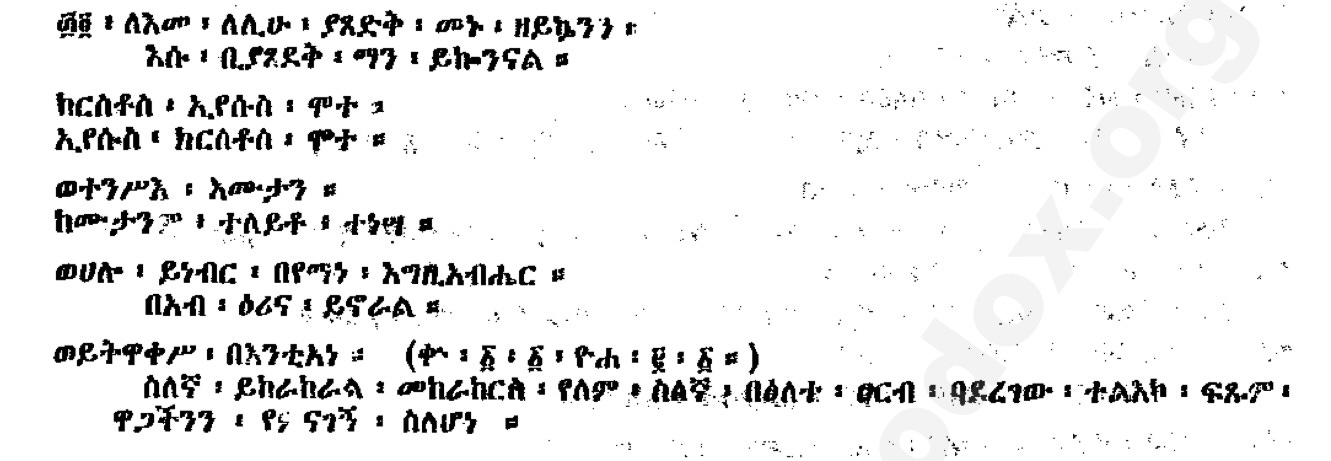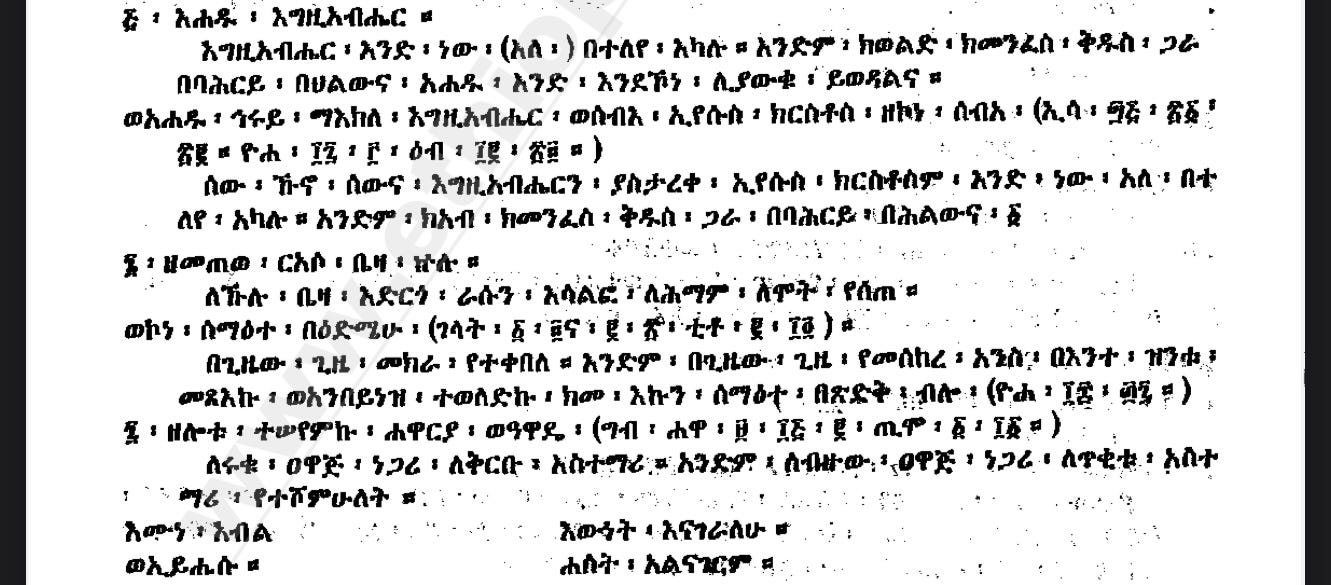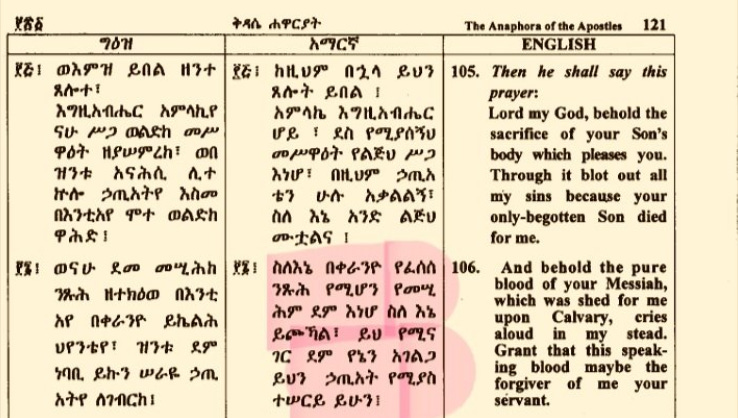There are bishops in the Ethiopian synod right now that should immediately repent or be defrocked for denying the intercession and mediation of Christ (Romans 8:34; 1 Timothy 2:5; Hebrews 9:15). They tried to excommunicate my beloved former bishop his beatitude Abune Barnabas. They failed again. Their last attempt was in 2018 when there were two competing synods and he was vindicated then on both sides. This time they took advantage of ethnic strife and separatist sectarianism exasperated by government foment. Instead, he won.
Kinda. Three bishops were accused of heresy. Initially, it was Abune Gabriel, who was unceremoniously appointed to his position to fulfill a racial quota in the minds of the separatists, as if the apostles being super-majority Galileans is damning, who was formally accused of false teaching regarding the application of the term redeemer/redemptrix. The merits of his case get bogged down in linguistic games that I am not addressing here. The second accused was Abune Philip, dean of Holy Trinity Theological College in the capital city Adees Abeba, who is accused of saying that without our lady the Holy Virgin Mary there is no Holy Trinity…
The three bishops were said on EOTC TV’s youtube channel to have all asked for forgiveness and that they would correct their false teaching publicly on camera. Abune Gabriel and Abune Philip, as far as I know, have asked for forgiveness. It was alleged that Abune Barnabas had as well. I asked him in person, and he said that he never asked for forgiveness for teaching what is the universal dogma of the Orthodox Church, but for any who may have misinterpreted him as commanding the laity to eat asses or confused the intercession of the Lord Jesus with the intercession of the saints. He has never taught that the Lord is now at the right hand of the Father bowing and praying. Rather, the whole of his efficacious and salvific intercession is from his precious blood spilled at the place of the skull which even now speaks and cries aloud louder than the blood of Abel.
I have begun reaching out to the metropolitans of the Syriac Orthodox and Coptic Orthodox in the metropolis of Los Angeles. I know that what I teach and what Abune Barnabas teaches aligns with them. On all matters of dogma (unchanging teachings), there can be no differences amongst the Afroasiatic Orthodox. There can only be difference in cultural expression and local canons (i.e. what time to start the liturgy on Sunday, how long a given fast is, the vestments of the clergy).
Notes:
-in my homily this passed Sunday I used the Catena app to source quotes on Romans 8:34 from St. Irenaeus of Lyons, St. John Chrysostom, and St. Severian of Gabala (foil and antagonist of the man with a golden mouth).



-His Holiness Pope Shenouda of blessed memory says, "Christ is higher than the heavens and He is in heaven interceding for us. St. Paul the Apostle says that "He ever lives to make intercession for them. For such a High Priest was fitting for us, who is holy, harmless, undefiled, separate from sinners, and has become higher than the heavens" (Heb. 7:25,26)


-Though he was not in communion with us, it is helpful to see what the late great Greek Orthodox (of slavic persuasion) Protopresbyter Thomas Hopko of blessed memory had to say on this matter in his Names of Jesus podcast:
Holy Scripture tells us there is "One Mediator between God and men" (I Timothy 2:5). Fr. Tom Hopko teaches on Christ as our Mediator and Intercessor.
Transcript
Aug. 18, 2011, 3:11 a.m.
In the New Testament Scriptures, our Lord Jesus Christ in several places is called the Mediator. In Greek that would be mesitēs, the mediator. And he’s called Mediator in several different ways: as a noun. The term “intercessor” as a noun does not exist, at least, I could not find it, but the fact that Jesus, as Mediator, lives eternally to make intercession, to intercede or to plead or to appeal or to turn to on behalf of us as Intercessor, that is definitely a teaching in the Holy Scripture. Although the noun “intercessor” is not used, the expression “to make intercession” is used, and the verb there would be “entynchanein, to make intercession, to act as an inter-mediator.”
When we think of Jesus as Mediator, probably, for most Christians, most people who are familiar with the Holy Scripture, the text that would immediately come to mind would be the text in I Timothy, and it’s a text often quoted, and sometimes it’s a text quoted to perhaps by those who do not want to affirm the divinity of Christ, because the text in Timothy says this (I Timothy 2:5):
For there is one God, and one Mediator between God and human beings (and men): the man, Christ Jesus.
You see? So this is the text: “There is one God.” You see? One God: heis gar theos (one God) kai eis mesitēs theou (and one mediator of God) and anthrōpōn (human beings): one mediator of God and humans, or we might say in English: one mediator between God and human beings. Then it says, “anthrōpos Christos Iēsous”: “eis gar theos eis kai mesitēs thou kai anthrōpos Christos Iēsous.” Now, “anthrōpos” means “human being,” so it says, “There is one mediator between God and human beings, the human being (anthrōpos), Christ Jesus, Christos Iēsous.”
Here we want to say, first of all, very important: Jesus Christ, Jesus the Messiah, Jesus of Nazareth is anthrōpos. He is definitely a human being. The Nicene Creed will sum this up when it says that “who for us and for our salvation came from heaven, was incarnate of the holy Theotokos and Ever-virgin Mary, kai enanthrōpēsanta—and became human, and was humanized, became human.” So of course it’s the Logos, the divine Son of God who becomes human, but he becomes a human being, a first-century Jew, Mary’s child, Joseph’s child by the Law: a man. And this is a dogma of ancient Christianity.
And I will stress again: it was a dogma that was hard-won, because every heresy about Jesus, practically, in the first thousand years of Christian history was somehow—I can never find the verb here—somehow—what do I want?—not really insisting on the full humanity. Compromising. That’s it. Somehow compromising the humanity of Jesus. They’ll say, “Oh yeah, he was human, but not really human, not human like the rest of us. He’s God. He’s God. He acts like a human. He took a human body. He was in a human form. But he wasn’t really human.” Well, by the time you get to the fifth century in ancient Christianity, at least for some of us, there is no doubt whatsoever but that he is human. The Council of Chalcedon in 451 will say he is theos (divine, God), with the same divinity as God the Father, being of one essence with the Father, but he is anthrōpos with exactly the same human nature as all anthrōpoi, as all human beings. He is truly God and truly man; really God and really man; really divine, really human.
As Mediator, as mesitēs, the one and only Mediator, this is the man, Jesus, because the Mediator has to be a mediator for us, and therefore he has to be what we are. If Jesus were not really and truly human, he could not function as a Mediator for us with God, because in that case he would just be God. He would just be God himself, only, the one with whom we have to have the mediation, the one with whom we need an intermediary, the one that we need to make intercession on our behalf, being one of us. He has to be one of us. It’s the man, Jesus, here, who is the mesitēs according to the Scriptures, certainly according to the I Timothy 2:5.
In the Letter to [the] Galatians, that same word, “mesitēs,” is also used for Jesus, and this is what it says in Galatians 3:20. It says, “Now a mediator is not a mediator of one, but God is one.” Or, if you put it another way: “ho de mesitēs enos ouk estin.” In other ways, a mediator that’s only one cannot be a mediator, because to have mediation, you have to have two parties. But then he says, “God is one,” so the other party has to be what is not God. You see? So he says, “ho de mesitēs enos ouk estin,” now the mediator of one is not one, but God is one, therefore, the mediator has to be another one.
As introducing this particular sentence, the 19th verse, would say this: If the inheritance were of the Old Testament law, it could not be because of the law because it would not be applicable. Therefore, it says, “it was added because of transgression.” The law is added because of transgression, “until the seed should come”: to sperma. And that means the seed of Abraham that was promised [to] be the one in whom all the people of the earth would be blessed. That’s what St. Paul is writing about, both in [the] Galatian letter and [the] Romans letter. In other words, God made a promise to Abraham—that’s in the Letter to [the] Hebrews, too; in fact, that’s in the New Testament generally, but especially Galatians, Romans, and Hebrews—God made a promise to Abraham that in his seed—and that seed would have to be a human seed because he’s got to be the son of Abraham, this child of Abraham—that all the people, all the human beings of the earth would be blessed.
And then in Galatians, St. Paul [says] that seed is one. There’s only one seed, and that seed, according to St. Paul in Galatians, is Jesus Christ himself. The seed: you say, he doesn’t say many seeds; he only says one seed, and that one seed, he says in Galatians 3:16, hos estin Christos, who is Christ. See? He speaks of seeds, not of many, but as of one, and to that one seed which is Christ. Now, it says, when the seed should come to whom the promise was made, it was ordained by angels in the hand of a mediator, so that there would be a mediator between God and man. Now God is one, so there has to be one human mediator that would be the one who mediates between God and between human beings, and St. Paul says that that one mediator, that one mesitēs, is Christ, is Jesus Christ.
So it’s clear, pretty clear, to me, anyway, that Jesus is this mediator, the mediator between God and man, the one mediator, the human being, the anthrōpos, who stands for us all before the face of the Father. As mediator, it means the one who stands in between. It could also be translated “intermediary,” the one who stands in the middle, between, and the one who pleads or makes intercession, and here the verb is “entynchanein,” the one who makes intercession or brings the complaints or makes the case to God.
In our reflections about the names and titles of Jesus, we already reflected on Jesus as paraklētos, the paraclete, the one who advocates on our behalf, the counselor, the one who stands next to us and calls out on our behalf to God, kind of the defense lawyer, and in that sense, [paraklētos] and mesitēs, they somehow go together. The intermediator is the one who is advocating, so, in a sense, there is a very similar function being spoken about here, and it will be spoken about also in terms of this verb, to plead or to appeal or to bring the case or to make the case on our behalf to God.
In the Letter to the Hebrews, you have this case being made several times in several different ways. For example, you have in Hebrews 7:25, it says that Jesus Christ is able to save everyone ultimately that come unto God through him. Why? Because he lives forever to make intercession on their behalf. It says, “pantote zōn” in Greek, “always living eis to entynchanein (in order to make intercession) hyper aftōn (on behalf of them, or for their behalf).” So this intercessor is the one who makes intercession. This is what it would say in the Letter to the Hebrews.
But in the Letter to the Hebrews, you have not only the one who makes intercession, but this one who makes intercession is technically called, again, “mesitēs, the mediator” or “the intermediary.” So, for example, in the Letter to the Hebrews in the very next chapter, the eighth chapter, you have this being written. The author is speaking about how Moses interceded on behalf of the people, how Moses stood in the breach, how Moses begged and pleaded to God on behalf of the people, and we know about that from the Pentateuch, from the writings of the Old Covenant. But now, according to St. Paul and the author of Hebrews, he says now there is a more excellent, diaphorōteras, more excellent: it’s a comparative adjective: more excellent has Christ obtained, has he obtained a leitourgias, a leitourgia.
So there’s a more excellent liturgy or work or common act. It says in the King James “ministry”; I’m not sure what it says in the RSV, but the word in Greek is leitourgia: that’s where we get the term “liturgy.” That Christ has more excellent than Moses because also it says, “by so much indeed of a better covenant,” a better diathēkē, a better testament, this new and final testiment, it says, “of which he is the mediator,” he is the mesitēs of a better diathēkēs, a mediator of a better testament, a better covenant, “which was established upon better promises,” and [those] are the promises made to Abraham, that in him all of the nations, all of the people of the earth, all human beings would be saved.
Jesus has this leitourgia to be the mesitēs, the mediator, of the new and better covenant. And this will be said very specifically in the Letter to the Hebrews. For example, in the ninth chapter, in the fifteenth verse, it says, “For this cause, Jesus is the mediator of the new covenant: kai dia touto (because of this)...” and the “this” that is being referred to is the fact that he offered himself up as a lamb of God and that through his Blood, by being led by the Holy Spirit, he offers himself in sacrifice to God in order to be this mesitēs diathēkēs kainēs, the mediator of a new testament, a new covenant.
And this being mediator of the new covenant, in the Letter to the Hebrews, is also spoken about in the twelfth chapter where you have exactly the same expression. In the [22nd] verse of the twelfth chapter, it says that we have come in the Church, not simply where Moses was, to a mountaintop, to fire, to the giving of the Law, but we Christians have come to the city of the living God, to the heavenly Jerusalem, to innumerable assembly of angels, to the general assembly and Church of the firstborn—the word is “ekklēsia,” to the church of the firstborn.
We have come to the panēgyrei kai ekklēsia prōtotokōn. We spoke about that when we spoke about the firstborn. And then it says, “and to the God who is judge of all, to the spirits of all the righteous people made perfect and to Jesus, and to Jesus, the mediator of the new covenant, and to his own blood that is sprinkled.” So in Greek it would say this: “kai diathēkēs neas mesitē Iēsou—we have come to the mediator, Jesus, of the new covenant, the new testament, and to the blood that he has sprinkled, by which we are redeemed.”
When Jesus is called the mediator of the new covenant, or the mediator of the new testament, and again, this is throughout the Scriptures; we could mention right now that it’s way back in the Letter to the Romans, in the eighth chapter, you have about Jesus being the one who is, in this sense, the one who not is the mediator but the one who pleads, the one who appeals, the one who intercedes. So you would have in Romans 8:34, it says, “It is Christ who died, yea, and is even risen again, who is even at the right hand of the Father, who also makes intercession for us,” who also entynchanein hyper hēmōn, who lives to make intercession for us. And that’s what the Letter to the Hebrews says, that he lives to make intercession for us. “He lives forever to make intercession for us”: that’s the seventh chapter of the Letter to the Hebrews.
The Mediator is alive and he makes intercession for us. In speaking about this mediation and living to make intercession, which is what Jesus does for us, we have to notice, always, that in every context where this teaching is made—and as I already said, it’s made very often in the Letter to the Hebrews, but it’s also found in Romans; it’s found in Galatians; it’s found in I Timothy; those are the main places that you have it, and Galatians and Romans, it’s connected with the promise to Abraham being that seed that will be the one intercessor—it is always connected to his death. It’s always connected to the shedding of his blood. It’s always connected to the new testament in his blood. It’s always connected to the new testament that is in his broken body and shed blood. It is always in the context of leitourgia, of offering, of sacrifice, of worship, of entering into the presence of God on our behalf, to be the Mediator before the face of God the Father, living to make intercession on our behalf, and he does it through his blood.
So the term, “mesitēs, mediator,” it’s often connected in the Scripture with the title of Jesus, “high priest, archierevs,” because the archierevs, the high priest, and priesthood in general (hierosynē), is by definition a mediating ministry. Just that simply the meaning of the term: if a person is a priest or has a priestly ministry, that ministry is intercessory and is a mediating and an intermediating ministry between human beings and, in fact, on behalf of the whole cosmos, before the face of God. The priest is the one who mediates, who intercedes, who offers on behalf of, who stands in behalf of, who pleads and appeals and prays and worships before the face of God for his own sins and for the sins of the people. That’s what you find in the priesthood in the Old Testament.
In the New Testament, this high priest who is the mediator, the intermediator—and this is very clearly the teaching, and it’s the whole purpose of the Letter to the Hebrews—that high priest is not according to Aaron or Levi; it’s the high priest that [is] according to Melchidezek. It’s a new priesthood; it’s an everlasting priesthood; it’s an eternal priesthood. It’s not a priesthood that takes place on earth; it’s a priesthood that takes place in heaven, because the mediator enters into the presence of God to intercede on our behalf. He is made alive, as it says in the letter, never to die again, to make this eternal appealing and pleading and interceding and being the intermediator and the mediator between God and man as the man Jesus, the high priest, who is killed and sheds his blood for the sake of our being reconciled to God. That’s how the mediation goes.
So if we went back and looked at some of these texts and read them, not just that one sentence where you find the term “mediator” or “lives to make intercession,” and I read those texts in isolation, but if you read them now more in context, we will see right now, I will show you right now by reading the texts, how they are all connected to the ransom, the redemption, the offering of blood, the sacrifice, the priestly offering. That’s how the mediation takes place. The Mediator is the great High Priest, and he is the Paraklētos. He is also the Advocate. That’s how these things come together.
So let’s go back now and read again the Letter to the Hebrews. This is how it says in the more, in the wider reading. It says this: there were many priests in the Old Testament, but then a new priesthood arises according to the order of Melchizedek. And in the seventh chapter [of the Letter] to the Hebrews, the name “Melchizedek” is used one, two, three, four, five times. At least five times, and that is the new priesthood that Christ enacts. That’s what he is; that’s what he does. And then this is what it says (Hebrews 7:23-27):
And truly in the old days there were many priests, because they were not allowed to continue forever by reason of the fact that they died.
So the priesthood could not be eternal because the priests kept dying, and they kept having to [have] new priests, and they kept having to be offering more sacrifices. But then it says:
But by this one...
In King James, it says “this man”; the word “man” is not there, by the way. It just says, “But in this one, in this person…”
...it remains for him forever, untransmittable has his hierōsynē, his priestly office become.
So if you read it, just what it says in the King James old English, it says, “But this one, because he continues forever, has an unchangeable priesthood.” And even the term doesn’t mean “unchangeable.” “Aparavaton” means “intransmissable.” He can’t transmit it to anybody else. It’s hapax; it’s once and for all. Why? Because he’s not dead. And so the next sentence continues:
Wherefore he is able also to save those to the uttermost.
It says in King James, “Which means to save them forever, always, entirely.” Why? Because he lives forever to make intercession for them: “pantote zōn eis to entynchanein.” I read this earlier: he’s always living in order to make intercession hyper aftōn, on their behalf or for them. Then it even continues, and now I’ll read [where] it continues:
For such a high priest we have: suitable high priest, holy, undefiled, harmless, separated from sinners, higher than the heavens, who does not need daily as those other high priests to offer up sacrifices for his own sins [and then] those of the people, but he (this one high priest, according to Melchizedek) does this forever when he offers up…
And what does he offer up? He offers up himself.
...when he offers up himself.
That’s what he does.
So the mediation that Jesus the Mediator effects is offering up himself, his own life, to God, and then, dying on the Cross and being crucified, he’s raised up by God, and he lives forever and enters into the sanctuary not made by hands in the heavens, to be forever our High Priest and Mediator before the face of God, living forever to make intercession on our behalf. And that’s what we have also in the eighth chapter. He has a more excellent leitourgia because he is the mesitēs, the mediator, of the more… of the better covenant, which was established upon the promises, the covenant that would be everlasting, that would be forever and would literally, literally never end. So this is what you find in the Letter to the Hebrews.
As I say, it’s connected always with offering, ransom, priestly sacrifice, dying, being raised, entered into the presence of God, and remaining alive. So let me give another example, from the ninth chapter of the Letter to the Hebrews. We read one sentence of this before; now we’ll read the whole paragraph. It says this (Hebrews 9:11):
But Christ, becoming a high priest of the good things to come (the blessings to come), by a greater and more perfect tabernacle (a greater and more perfect skēnēs; you see, the tabernacle was the place where the sacrifice was made), a tabernacle that is not made by human hands (ou chieropoiētou; it’s achieropoiēton, that particular tabernacle: not made by hands), that is to say, not of this building (not of this creation is what it says in Greek; it’s a tabernacle not of this creation).
Then it says:
Neither by the blood of goats and calves, but by his own blood he entered in once and for all into the holy place.
And that holy place that he enters into, once for all, is ta hagia, and that’s a plural, and in the Old Testament, it meant the Holy of Holies: the holies, the holy place. It’s singular in English; it’s plural in Hebrew and Greek. Then it says:
Having obtained an eternal redemption (an aiōnian lytrōsin, a redemption that’s everlasting, eternal, forever) for us.
And then it continues. The blood of bulls and goats can’t do this. The blood of goats can’t do this with the Levitical priesthood, but the blood [of bulls and] goats still function for redemption and purifications of a temporary nature. So then the author continues:
How much more shall be the blood of Christ who through the eternal, Holy Spirit offered himself without spot to God…
See? Made the eternal offering, unblemished, to God.
...how much more will that cleanse our consciences from dead works to serve the living God?
Then you have the sentence where you have “mesitēs”:
For this cause (for this reason or therefore), he is the mediator of the new testament (the new covenant)...
And how?
...that by means of death, for the redemption of the transgressions that were under the first covenant…
You see?
...which of those who are called might receive the promise of an [eternal] inheritance.
So it says he is the mediator of the new covenant which he offers in his death to become an apolytrōsin, to make redemption, in order that we could be the klēronomia, that we could have the inheritance, the heritage of God, and that inheritance is to become the heirs of the promises that were made to Abraham. And we spoke about Jesus being the Heir, also, the one who inherits everything.
What we see here is how this mediation is connected with the priesthood. It’s connected with the sacrifice. It’s connected with his death. It’s connected with redemption. It’s everlasting. It’s made by the everlasting Spirit. It enters into the heavens. It’s not on earth. It’s not part of creation. This is the kind of mediation that Christ does in order, then, to make this intercession on our behalf, living to make intercession on our behalf.
And as we already saw, in the twelfth chapter of Hebrews, where it says how we go into this assembly of angels and to the heavenly Jerusalem, and then it says, “to Jesus, the mediator of the new covenant,” and then it immediately mentions his blood: the blood, you see, that speaks more eloquently than the blood of Abel, than the blood of the bulls and the calves and the goats. It’s the blood by which the mediation between God and man is effected in the Person of Jesus, that one sperma, that one seed, that one anthrōpos, the one man, the one high priest, the one paraklētos, the one paraclete. This is who Jesus is.
We can say that he is the Mediator, the Mesitēs. In the Scripture as I mentioned, he is never called the Intercessor, but it does say that he lives to make intercession, being the one mediator.
One more thing for today, and that is this: once again, all those who are in Christ, all those who are sacrificed to God the Father together with Christ Jesus himself by the eternal Holy Spirit, in other words, all those who are baptized in Christ and die with Christ, all those who offer their bodies as a living sacrifice to God which is our logikē latreia, our spiritual worship… And we spoke about that before in these reflections: that the sacrifice that we make is our bodies as living sacrifices, just like Jesus offered his body as a living sacrifice.
The point we want to make now, though, is this: by faith, by grace, by being en Christō, in Christ, by receiving the same Holy Spirit, by entering with Christ into the Holy of Holies above the heavens not made by hands, by sacrificing ourselves and being sacrificed together with him, we also become mediators who live to make intercession. And that is the theological foundation for the intercession of the saints, and the fact that the saints, the holy people, are mediators. And in our ancient Eastern Orthodox Christian tradition, the first and chief mediator is Christ’s mother, Mary.
Jesus is the one man, the Mediator between God and man, the man Jesus Christ, but he is also God’s Son. He is also the high priest according to Melchizedek who has no generation, human generation. He is also the incarnate Logos of God. He is the one who was in the form of God and was found in the form of man and emptied himself on the Cross in order to be the Mediator and to make the intercession. So Jesus is really a man. We affirmed this strongly at the beginning of today’s reflection. But he is more than a man. He is a real man, but not a mere man. But in him, the real man, Jesus, the one seed, the one mediator, the one man, the one Adam, the one high priest, the one teacher, the one prophet, the one everything, we become what he is by grace. That’s an absolute, unchanging principle and central conviction of Christianity. He became everything we are so we could become everything he is.
If he is Mediator, we can be mediators, too. If he lives to make intercession, we can live to make intercession, too. And the Orthodox Church is very clear, from the earliest time, speaking first of all about the martyrs who died with Christ, that’s how the whole veneration of saints began in Christianity, that they were the martyrs who not only were baptized into Christ with water and therefore died with him in baptism and were raised together with him from the dead, but they really did die, and they really were raised, and the martyrs really were alive, and they really are alive with Christ and God.
And right now all who are dead in Christ are alive in Christ already. On earth, it is not already happened, but in eternity, in the everlasting kingdom, it already has. What has not yet happened on earth has happened already in Christ in the heavens. That’s why we on earth, like, for example, in the twelfth chapter of the Letter to the Hebrews, it says we come to an assembly of the angels and to the Church of the firstborn whose names are written in heaven and to the great cloud of witnesses of the souls and the spirits of the righteous made perfect. And, by the way, that prayer is used in the prayer of the funeral in the Orthodox Church. We sing, “With the spirits of those made perfect, of the righteous ones made perfect, made the person who has died be together there in Christ.”
So we believe that the dead in Christ are already in Christ. They are already in the presence of God. Christ has filled Sheol, the realm of the death, with himself. Death is no more. Sheol has become paradise. No one remains in the tomb any more as far as God is concerned. So it is our teaching that we relate to, not only to Christ God himself, but to all who have died in Christ as those already risen and glorified at the right hand of the Father, beginning first of all with his own mother, Mary, and the greatest of all those born of women, John the Baptist, because they’re all now with Christ and God. So it’s very important that human beings, mere human beings, sinful human beings, by faith and grace, can act as mediators and intercessors for other people.
Anybody who’s ever read the New Testament will know that this is the teaching certainly of us while we’re still on earth. We say, “Pray for one another. Make intercession for one another.” It says, “The prayers of the righteous have great power in their effect” (James 5:15). That’s the Letter of James, of course. St. Paul is always saying, “I live and I make constant prayer on your behalf. Be constant in prayer.” And then you have the appeal: “Pray for us. Do not forget us. Intercede for us before God.”
And here, any normal Christian on earth will pray for other people. We’re commanded to pray for our enemies, for example. “Bless those who curse you. Pray for those who abuse you.” So we are told to be intercessors. We are told to be mediators. We are told to be those who stand in the breach on behalf of other people, especially sinful people. We pray for other people’s forgiveness. We pray for their conversion. We pray for their healing. We pray for their spiritual growth. We pray that God’s will would be done in their life. We pray for all kinds of stuff. And that’s mediation, and that’s intercession.
But what we have to add here is this: even when we pray on earth for each other, we do so in Christ. We even say, “In Christ’s name we do this.” We say, “Hrista radi,” in Slavonic: for his name’s sake, because of him. And we always offer our prayers to God in the name of Jesus. There’s even a formula in Western Christianity: “We ask this in Jesus’ name—in nomine Jesu, in nomine Christi.” So we’re never just standing in our mediation, in our intercession, by ourselves. We always do this in Christ. And we bring up Christ’s name and we say his name and we ask in his name.
The praying, the mediation, the intercession, and even the offering of the sacrifices [are done in his name]. For example, we offer the sacrifice of bread and wine in the Divine Liturgy, but that’s together with Christ, and in and with him, not on our own. We even pray in the Liturgy that the one who offers and is offered, who receives the offering and the very gifts of the offering that we eat and drink in Holy Communion is Christ himself. He is the one who is offered and offers, who receives the offering and is distributed as the prosphoron, the offering.
Whenever we pray, it’s always because of Christ, and it’s always in the Holy Spirit. And by the way, in the Letter to the Romans, in the eighth chapter of the Letter to the Romans, it even says very specifically that the Holy Spirit is an intercessor. The Holy Spirit intercedes on our behalf when we don’t know how to pray. And even that term, “mesitēs,” is used for the Holy Spirit, not only for Christ. I can read it to you right from the Letter to the Romans. It says (Romans 8:26), “Likewise the Spirit helps us in our infirmities (helps our infirmities), for we know not what we should pray for as we ought, but the Spirit itself makes intercession—afto to pnevma hyperentynchanei.”
It’s the same “make intercession,” “supplicates on our behalf, with unutterable groanings,” it says: “with unutterable groanings.” And it says several times that he makes intercession: “kata theon enynchanei hyper hagiōn—he makes intercessions for the saints.” So the Holy Spirit is the one who also is making intercession, functions as a mediator.
You can almost say, and some of the Holy Fathers would say that the Holy Spirit is our mediator with Christ, and then our Christ is the mediator with God the Father, but then we, being filled with the Holy Spirit, and becoming members of Christ, and sharing the Body and Blood of Christ, we become mediators of the Holy Spirit’s power and grace in and together with Jesus Christ, before the face of God himself to whom also we can make our prayer as to our Father, being our Father in Christ, because in Christ we also become sons of God. It’s very important, and we should not back off of this. And when there are those Christians who say, “Oh, the only mediator between God and man is Jesus”... That’s not scriptural. It says, “The mediator between God and man is one; there is one mediator between God and man: the man, Christ Jesus.”
However, that one mediator includes us in his one mediation, that one intercessor includes us in his intercession. He does it alone, so to speak, but he invites us to do it with him. That’s how kind he is. That’s how merciful and generous and gracious God is. Jesus Christ doesn’t simply say to us, “Don’t pray. Don’t mediate. Don’t intercede. I’ll do it all for you. You don’t have to do anything. Don’t do nothin’. I’ll do everything.” That’s just plain, well it’s just plain stupid; excuse me. Jesus doesn’t do all that he does so that we don’t have to do it. He does it so that we can do it, and we have to do it, but we have to do it with him and we can’t do it by [ourselves].
But we can do it with him, and we have to. We’re commanded to. We’re commanded to be mediators, and not only on behalf of one another, but on behalf of the whole creation. For example, at the Divine Liturgy, when we offer our prayers by the Holy Spirit in and with Jesus Christ and through Jesus Christ to God the Father, we say, “We’re offering to you what is your own on behalf of all and for all—kata panta kai dia panta—through all and in all, for all and by all,” but this is in Christ.
So we can’t be mediators by ourselves. That’s ridiculous. We need the mediation, but once we have that one Mediator between God and man, the man Jesus, then in and with and through him and by him and by his grace and by faith, we enter into that mediating, intermediating, intercessing, appealing reality. So we Orthodox Christians, ancient Christians, following the ancient way, we ask each other to mediate and to intercede for us. We ask each other’s prayers. But we also ask the prayers of all the saints. We ask the prophets to pray for us, the apostles to pray for us. We ask first of all Christ’s mother, Mary, the greatest of all mediators and intercessors, to pray for us. We ask John the Baptist to supplicate and to intercede for us. We ask all the holy martyrs who died for Christ, all the confessors, by their blood, to offer it as mediation and intercession together with the Blood of Jesus, hyper hēmōn, on our behalf, for us.
We ask all the holy bishops, all the holy pastors. We ask all the holy ascetics, the monks, the nuns, the stylites, all the great holy fathers. We ask the unmercenary physicians and healers. Remember when we spoke about Christ as the Physician? We said that he shares his power of being a healer with the saints, and the saints then become healers. They become unmercenary healers, holy physicians. So we ask their healing power, which is the power of God who is Christ, not on their own. We don’t ask Panteleimon and Hermolaos and Cosmas and Damian and Cyrus and John and all those intermediaries, Hermione, Zenais, Philonilla. It’s because they’re in Christ that they can do these things, so they can heal by his power and mediate and intercede by his power.
And in fact, we ask all the righteous people. To use the language of Hebrews 12, we ask all the righteous whose spirits are in the presence of God right now to intercede on our behalf. In the Apocalypse, it says that they’re all beneath the altar, offering the prayers and the incense to God. What for? For our salvation! So even in the Apocalypse, the Lamb, who mediates before him who sits upon the throne, meaning Christ who intercedes before God the Father, and then the Lamb himself is seated on the throne, and then all the 144,000 and all the angels and all the saints and all the righteous from all the nations and from Israel, they’re all singing, “Alleluia! Praise, glory, dominion, and majesty be to God and to his Christ forever!” And so they mediate and intercede for us, who are still on earth, trying to fight the good fight and trying to carry on properly so we can enter into that reality with them at the end of the age, after our death, and when this age is over, at the end of the world.
But on earth right now, we can enter into that already. We have the Holy Spirit as a guarantee, as the aravon, as the earnest, as the foretaste, as the pledge. And we are in the Church, whereas the twelfth chapter of the Letter to [the] Hebrews [says], we enter into that Church of the firstborn in heaven already now, and we enter into the intercession and mediation of Christ and all the saints and all the angels and his holy mother—already now. And this is this great glory of the Christian faith.
The one and only Mediator between God and man is the man Jesus. And that Mediator has to be one because God is one. That’s written in I Timothy and Galatians. And that he lives to make intercession on our behalf is in the Letter to the Romans and the [First] Letter to Timothy and the Letter to [the] Hebrews. It’s in the Holy Scripture. It’s in the Apocalypse when the Lamb is interceding for us with his Blood. And so the ransom, the offering, the sacrifice of the Lamb is a mediating, intercessing act, pleading on our behalf before God.
Jesus Christ himself alone is the one Mediator and the one Intercessor before God the Father on behalf of all and for all, and he does this because he’s filled with the Holy Spirit and he’s filled with all the fullness of God, even sōmatikos, even bodily, as it says in the Letter to [the] Colossians. But we enter into that. He mediates for us. He intercedes for us. And he gives us the grace and power to mediate and to intercede and to offer ourselves and our bodies as sacrifices for each other. So we enter into the mediating, interceding power of the one Mediator, the one Intercessor, the one Intermediary between God and man, the only Savior, the only Lord, the only great High Priest, the only Redeemer, the only Savior, our Lord Jesus Christ.
And then in and through him, we participate in that mediating, interceding, sacrificing, saving activity of God himself. How wonderful all this is, but it all is only and exclusively because of the one man, the one last Adam, Jesus Christ, who for today we must remember and never, ever forget: he alone is The Mediator, with a capital “T”: The Mediator who lives to make intercession on our behalf.
Copyright © 2005-2025
Ancient Faith Ministries, Inc.









